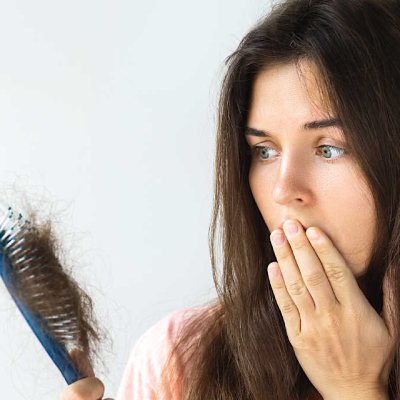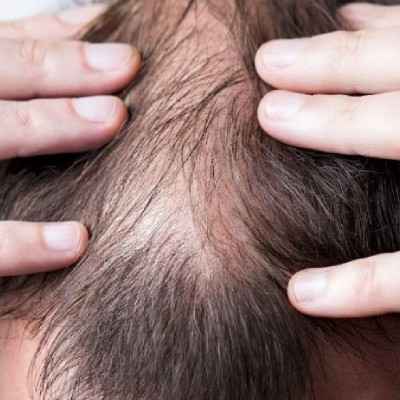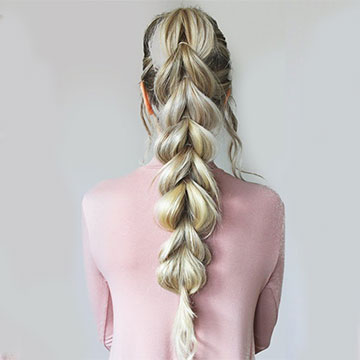All You Need to Know About DHT and Hair Loss

13 July 2022

Hair Experts @ AHS

DHT-related hair loss is a genetic trait that a certain number of men carry, and it triggers hair loss over time. Read on to find out more about DHT, its characteristics, and its impact on human hair.
Dihydrotestosterone (DHT) is a hormone that is a major factor in hair growth. DHT-related hair loss can cause miniaturization of hair follicles in the head and lead to hair thinning and hair loss in some men. In the U.S alone, 50 million men and 30 million women are said to experience DHT-related hair loss in their lifetime.
DHT-related hair loss is a genetic trait that a certain number of men carry, and it triggers hair loss over time. Read on to find out more about DHT, its characteristics, and its impact on human hair.
What is DHT?
Dihydrotestosterone (DHT) is an advanced form of the hormone testosterone. It is produced in both males and females. Dihydrotestosterone (DHT) is an androgen. An androgen is a sex hormone that enables and promotes the development of “male” sex characteristics such as bodily hair. DHT is also responsible for the development of other male characteristics such as a deeper voice, development of reproductive organs, growth of body hair and muscle mass, and alterations to the fat storage mechanism of the body.
However, in some men, it triggers the thinning and loss of hair on the head. This process begins at different stages for different men. Some may experience hair loss starting from the attainment of puberty itself, around 17 to 18 years of age. At the same time, some men may start experiencing DHT-related hair loss later in life.
Relation between DHT and Hair Loss
DHT-induced hair loss is known as androgenic alopecia. Around 10 percent of testosterone in all adult men and women gets converted to DHT with the addition of the enzyme called 5-alpha reductase (5-AR).
Once DHT begins to be present in the bloodstream, DHT can sometimes link itself to receptors on hair follicles in your scalp, causing them to shrink and become less capable of supporting a healthy head of hair. The hair follicle receptors are important for hair growth as they signal the loss of old hair and promote the growth of new hair from the follicles. Shrinkage of the follicles reduces their ability to grow thicker hair, and over time, takes away their ability to grow hair altogether.
While normal levels of DHT can result in male pattern baldness, having abnormally high levels of DHT has been linked to slower healing from injuries such as cuts and bruises, an enlarged prostate, prostate cancer, and even some forms of heart disease.
Why DHT affects people differently
DHT may be produced in both males and females, but it impacts different people differently. Apart from the differences between males and females in its impact, DHT impact on males differs a lot depending upon a variety of factors, including genetics. Genetics is the biggest determinant of the impact DHT will have on a human male’s hair follicles. It can be said with confidence that if DHT-related male pattern baldness runs in the family, then you, too, are extremely likely to experience it.
Effects of high DHT in men include acne breakouts, a quickly receding hairline, and hair loss at the temple and crown areas.
High DHT can result in clogging up of pores on the skin and increased oil production. This ends up impacting the breathability of the skin and results in acne breakouts. This is not that common in adults, but adolescent males going through puberty may experience this, as their bodies are going through hormonal changes, and DHT production may increase at this juncture.
High DHT is also related to a quickly receding hairline and hair loss in the temples and crown area. Variations in the androgen receptor (AR) gene can make some people increasingly susceptible to this. In males, this form of hair loss usually follows a characteristic pattern, starting with a receding hairline and proceeding to the crown area.
In the case of women, increased levels of DHT can result in increased facial and body hair. Irregularity of menstrual cycles (amenorrhoea) along with increased skin breakouts. Abnormal changes to the genitalia may also be seen in extreme cases of dihydrotestosterone.
Can DHT hair loss be reversed?

DHT hair loss, however, can be reversed with the right medication. As an added source of confidence, most of these treatments are FDA-approved and clinically proven.
There are two types of medications that aim to reverse DHT hair loss, DHT blockers and DHT inhibitors. As the naming suggests, DHT blockers prevent DHT from binding to the 5-AR receptors in your hair follicles that cause DHT to shrink hair follicles. DHT inhibitors, on the other hand, aim to reduce the production of DHT in the body.
There are various medications available to help treat DHT hair loss. These include oral medication such as finasteride and biotin and topical solutions that are applied on the scalp, such as minoxidil solution and pumpkin seed oil.
The most prescribed and well-known oral medication to combat DHT effects in men is finasteride. It is only available via a doctor’s prescription and has been clinically proven to regrow hair provided that hair follicles are dormant and not dead.
Finasteride works by blocking the enzyme called 5-alpha-reductase. This enzyme’s function is to convert testosterone to dihydrotestosterone (DHT) which results in the growth of the prostate or causes hair loss in men. Finasteride binds to 5-AR proteins, blocking DHT from binding with the receptors of the hair follicles and damaging them. It thereby boosts testosterone levels in the body, which increases hair growth on the scalp. The effects of finasteride however last only as long as the medicine is taken. Upon stopping the medication, the effects will wear off and hair loss may begin again.
For people who would rather apply a solution on their scalp, minoxidil is the most prescribed topical solution to promote hair growth. Minoxidil works as a peripheral vasodilator. It promotes the widening and loosening of blood vessels for the blood to pass through easily.
Minoxidil promotes hair growth by promoting blood flow to the scalp and revitalizing the hair follicles which helps it to retain hair and help grow new hair as well.
Best Treatment For DHT Hair Loss
In order to treat DHT hair loss, a combination of medication and lifestyle changes need to be adopted. As mentioned in the previous paragraph, the usage of minoxidil and finasteride are clinically proven to reduce hair loss and promote hair growth, but along with this, a healthy diet, regular exercise, adequate sleep, and various other lifestyle-related factors are required to be in check as well.
A few hair care tips to keep in mind alongside your treatment include regular shampooing at least 3 times a week with oiling your hair with follicle nourishing oils such as castor and coconut oil. In addition, the consumption of antioxidants, protein, and biotin-rich foods such as berries, nuts, spinach, and fish also help with promoting hair health. The addition of beta-karotene containing foods such as sweet potatoes also helps in providing the building blocks of hair to your body. Eggs are a pocket-friendly source of zinc, selenium, and other hair-healthy nutrients. This makes them one of the best and most affordable foods to consume for optimal hair health.
Can low DHT cause hair loss?
Similar to high DHT, too little DHT is also harmful. Again males and females experience different symptoms.
Signs of low DHT effects in men include loss of body hair, weight gain, decreased libido, and in some extreme cases, even breast development may be seen. These changes are caused by an imbalance in the progesterone and testosterone levels in the body.
Low DHT impacts muscular strength and reduces the body’s ability to hold on to a lean muscle mass. This results in loss of lean muscle and its replacement with fat tissue. Hence low levels of DHT can lead to unexpected weight gain.
Less than 1% of men are said to experience erectile dysfunction as a result of low DHT, and this can usually be fixed by engaging in activities that engage the production of testosterone such as increasing physical exercise, consuming protein-rich diets, and maintaining an active lifestyle.
Low DHT levels do not severely impact females, however, and may result in delayed puberty and lack of body hair growth in some cases.
Conclusion
Most people are unable to keep up with the various steps required to keep up hair health and regrow new hair. In order to provide a solution in the vast sea of various hair treatment options, Advanced Hair Studio has a holistic hair loss treatment and care program that provides you the benefits of the aforementioned medications, along with a complete hair care guide that is easy to follow, known as the Hair Fitness Program.
The Hair Fitness Program offers a hair-thickening shampoo that contains keratin to strengthen the hair follicles and contains special herbs that have been used since ancient times to treat hair loss and promote hair growth.
The hair serum contains a blend of nutrients, amino acids, multivitamins, and minerals that help in strengthening the shaft and promoting hair regrowth.
Finally, the hair regrowth herbal dietary supplement helps reduce hair fall in both men and women. This herbal pill needs to be consumed after a full meal. It has DHT inhibitors that reduce the formation of DHT and allow hair follicles to repair and grow lost hair back. The hair regrowth supplement is approved by the US FDA and TGA and is safe to consume.
Do pay Advanced Hair Studio a visit for a holistic hair consultation and take control of your hair loss today. It is one of the best hair fall clinics to consult if you are looking for a complete hair loss treatment solution.
Stay Updated
Subscribe to our email newsletter for helpful tips and valuable resourses
Be an influencer
Join forces with Advanced Hair Studio! Explore exciting collaboration opportunities tailored for influencers. Let's redefine haircare together.
Connect now












